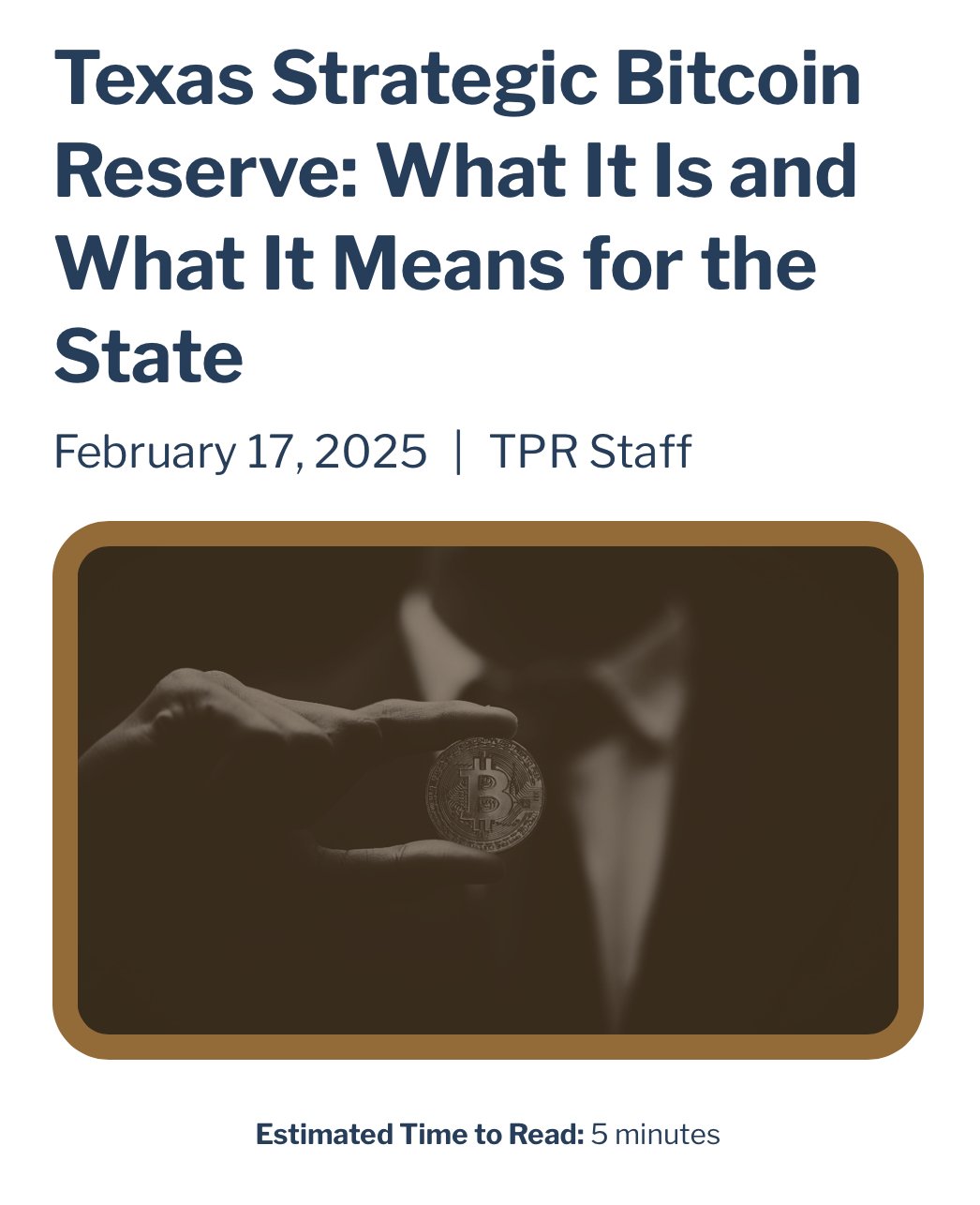A “state-managed investment fund focused on Bitcoin and other high-market-cap cryptocurrencies …” was introduced to Texas legislators this week as Senate Bill 21 (SB 21); a bill colloquially referred to as “The Texas Bitcoin Reserve Act.”
SB 21 was sponsored by State Sen. Charles Schwertner (R-Georgetown), as revealed by in-depth coverage from Texas Policy Research (TPR), a pro-liberty legislative analysis nonprofit organization.


TPR previously reported that in January, Lt. Gov. Dan Patrick (R) listed his Key Legislative Priorities for the Texas Senate’s current session.
“Establishing the Texas Bitcoin Reserve” landed (unironically?) at #21 on the Texas lieutenant governor’s published list of Top 40 priorities for the current session.
On Tuesday, CBS Austin reporter Michael Adkinson updated his followers on the new bill’s introduction, posting that the Senate committee had “… left the bill pending, without a vote.”
CBS Austin then reported later last night that although Gov. Greg Abbott (R) has not specifically commented on this legislation, that the bitcoin reserve bill was nonetheless,
“… expected to pass the committee, given the Republican majority and the fact that (Lt. Gov.) Patrick has named it a priority.”
But Elsewhere …
Bitcoin’s future in Texas might be viewed as faring much better than most other U.S. states’ attempts, however, where as many as 20 bitcoin bills are likewise currently being voted on.
Or perhaps “being voted against” would be a more accurate word choice.
So far, three bitcoin reserve-style bills, all introduced by Republican sponsors, have been shot down on their first attempts in the states of North Dakota, Pennsylvania and Wyoming.
Wyoming is notably home of high-profile bitcoin advocate Sen. Cynthia Lummis (R), who proposed the United States’ BITCOIN Act in July 2024, an act which is currently awaiting comment from the U.S. Committee on Banking, Housing, and Urban Affairs.
Wyoming’s failure to pass their state-level bill on the first round might be a negative portent of how bitcoin bills could yet fare, as a whole, during these 2025 State Legislative sessions, and given Sen. Lummis’ years of presumed strong pro-bitcoin influence there.
But many such recent bitcoin bills are still “currently under consideration” in the states of Illinois, Kentucky, Maryland, New Mexico, Ohio, Oklahoma and Utah, naming less than half.
Texas Just Keeps On Swinging
Despite three full strikes against U.S. state bitcoin reserves so far, Texas might reasonably be said to be poised to see a different outcome.
Texas is already home to a robust bitcoin mining industry which has been overall welcomed by the state.
There’s longstanding political activism efforts there, positive relationships with energy producers and one would say an overall familiarity with bitcoin, in general, among Texas residents — at least when compared to most states’ citizenry, because of these multiple driving factors.
Further, Bitcoin News reported in December that Texas House Bill 1598 (HB 1598), was introduced by Rep. Giovanni Capriglione (R), proposing,
“… the establishment of a bitcoin reserve within the state treasury and the management of cryptocurrencies by governmental entities.”
That bill successfully advanced to the Texas Senate Finance Committee, where it presently sits.
Combined, these many factors could mean that Texas becomes “the first state in the nation to establish a Strategic Bitcoin Reserve,” as Rep. Schwertner posted in January was his goal.
A Tale of Two Bills
The two bills now currently pending before Texas representatives quite honestly highlight differently nuanced approaches to both the establishments of, and the distinctive management styles of, Texas’ proposed bitcoin reserve(s).
Capriglione’s December HB 1598 calls for oversight of the fund by the Texas Comptroller of Public Accounts. Funding is proposed to come from voluntary donations made by private citizens, corporations and government bodies — without using taxpayer money to buy bitcoin — the bill specifies.
Conversely, Schwertner’s more recent SB 21, specifically authorizes the state to directly invest public funds into purchasing bitcoin “and other cryptocurrencies.”
Oversight of SB 21 is to come from within the Texas Comptroller’s office, by a smaller group of five, dubbed the “Texas Strategic Bitcoin Reserve Advisory Committee.”
Also, “One of the key differences is where the reserve is housed,” TPR reported, continuing,
“SB 21 places the Bitcoin reserve outside the state treasury, giving it greater autonomy and flexibility in investment strategies.
“In contrast, HB 1598 keeps the reserve within the state treasury, ensuring tighter state oversight and alignment with traditional government financial practices.
“SB 21 also allows the state to invest in various cryptocurrencies, not just Bitcoin, whereas HB 1598 strictly focuses on Bitcoin alone, treating it as a long-term asset rather than an investment vehicle,” TPR clarified.
Unlike the results some states are seeing on their first attempts at pitching bitcoin reserves, neither of Texas’ proposed bills have been decisively killed — “right out of the gate” as has already happened in North Dakota, Pennsylvania and Wyoming, as reported above.
Yesterday’s public hearing and the now two bills under active consideration in Texas may result in the United States’ “first steps” towards a state-level bitcoin reserve being signed into law.

